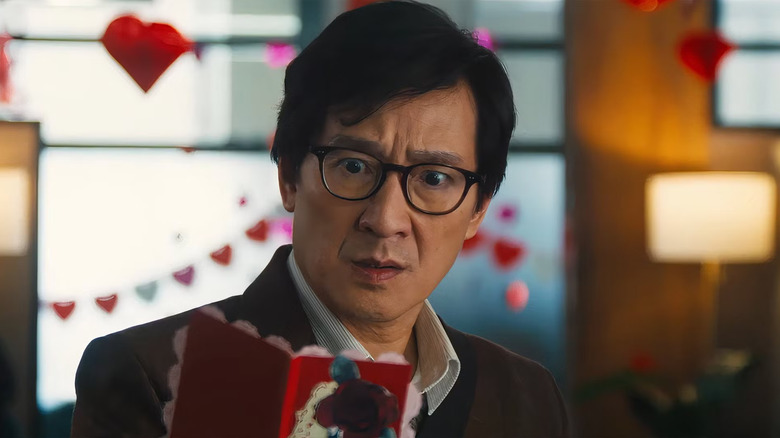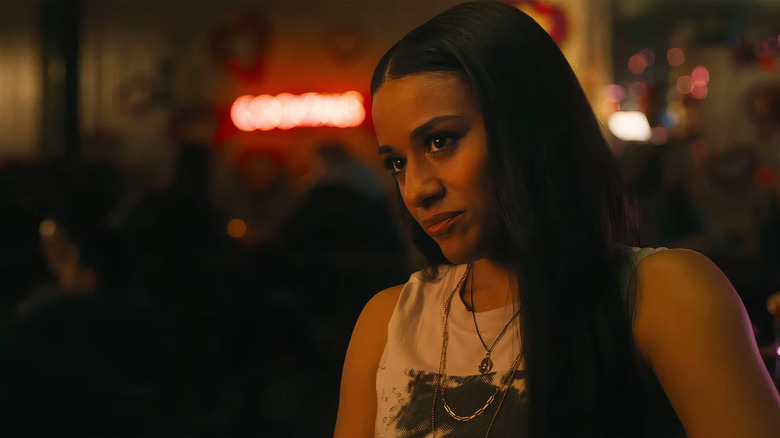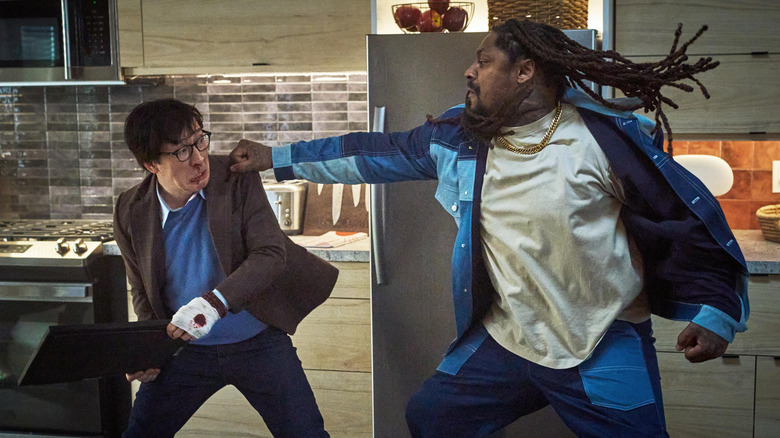
This author is old enough to remember a very particular period of cinema history that Jonathan Eusebio’s new crime-comedy/not-quite-a-romance “Love Hurts” appears to be aping. In the wake of Quentin Tarantino’s “Pulp Fiction,” way back in 1994, numerous movies began to appear to feature flippant, violent characters, their mouths full of pop culture references, usually becoming embroiled with byzantine organized crime plots, brutal assassinations, or other acts of bone-crunching mayhem. These films ratcheted up the bloodshed, but kept characters whimsical. The genre’s stars were too cool to be terrified by gun battles, and would murder with impunity, only to return to a conversation about movies, fast food, or some sort of personal quirk. Quirkiness was the guiding ethos of the era.
Some were comedic, others downbeat, but all belonged to the Post-Pulp era. “Goodbye Lover,” “Lock, Stock, and Two Smoking Barrels,” “2 Days in the Valley,” “Truth or Consequences, NM,” “Things to Do in Denver When You’re Dead,” “The Big Hit,” “Smokin’ Aces,” “Go.” The ocean was vast and deep.
Eusebio, a fight choreographer and stuntman who worked on films like “The Fall Guy” and “John Wick,” appears to be tapping, very distantly, into the whimsically violent Post-Pulp era with “Love Hurts.” This film is certainly one of Tarantino’s great-great-grandchildren. And while it contains almost no edge, and its humor isn’t funny — it’s more affable than hilarious — “Love Hurts” has at least a certain degree of bemused, violent verve and a mere modicum of kung-fu retro style. Case in point: It’s set in a parallel version of Wisconsin in 2025, but contains bizarrely ’90s elements; one of the film’s central settings is a Chinese boba bar that also has “Mortal Kombat II” arcade machines and appears to rent VHS cassettes.
Too much happens, and also not enough happens in Love Hurts
If you love exposition, “Love Hurts” will have you well-covered. After a few opening fight sequences, the flick settles into a very long groove — maybe a full 30 minutes — wherein multiple characters in multiple locations explain the fineries of the plot. Ke Huy Quan plays Marvin Gable, a star realtor in Wisconsin, happy to be the chipper-A.F. manic pixie dream-boss who brings sugar cookies to the office. He rides his bike to work, and is frustrated that someone is, like Daffy Duck, drawing mustaches on all his local bus-bench ads. Marvin also loves Valentine’s Day, which is fast approaching, much to his delight. It may be February in Wisconsin, but there doesn’t appear to be any snow. As of this writing, it is currently 29° in Milwaukee.
The action kicks off when Marvin is visited by a hulking assassin nicknamed The Raven (Mustafa Shakir), naturally possessed of several quirks: he keeps outsize blades hidden in his shoes and likes to recite poetry before killing a foe. Marvin suddenly displays madcap martial arts skills and manages to flee. It seems that he once worked as the murderous enforcer of his mob boss brother Knuckles (Daniel Wu), and he has been hiding out as a realtor for several years.
You see: some time ago, Marvin fell in love with Knuckles’ lawyer Rose (“Kraven the Hunter’s” Ariana DeBose), a woman 20 years his junior who is seemingly guilty of $2 million in theft out of Knuckles’ coffers. Marvin, rather than kill her as instructed, let her go free. She has since re-emerged, and, in so doing, activated various mobsters and assassins. Marvin happens to be the last one who saw her alive. We’re assured in dialogue that Marvin was (and still is) in love with Rose, although DeBose and Quan have no romantic or sexual chemistry. Love, it seems, is academic in “Love Hurts.”
Love Hurts is mostly exposition
There is some talk about how Marvin used to struggle with anger management issues and that his violent wrath was the “true” version of himself, but the actual bleakness of that character development is never fully explored. There are even a few darkly tantalizing moments when Rose, having reunited with Marvin, implies that his capacity for violence was his sexiest trait. Sadly, any notions of kink or exhilarating, violence-based love are actively smothered by the film’s lightweight tone. In place of romantic or sexual darkness are fistfuls of quirk and endless, endless exposition.
Among the ensemble: “Bottoms'” Marshawn Lynch and André Eriksen play a pair of bumbling assassins, with the latter constantly complaining about his strained relationship with his wife. Rhys Darby has a small role as a weaselly accountant, but the actor seems unallowed to cut loose. All the characters banter and bicker with one another, but their vicious/casual dialogue never breaks out into sparkling wit. Everything is mere small talk.
Indeed, far too much of “Love Hurts” is mere functional explanations. Multiple scenes in a row are devoted to the details of Marvin’s old life with his brother, or what Rose did to get the money she was accused of stealing, or who else might be responsible, or how Knuckles feels about Marvin. The “show, don’t tell” film school axiom isn’t a hard-and-fast filmmaking rule, of course, but “Love Hurts” could have shown more and told less. The overreliance on exposition keeps the pace sluggish throughout the middle third, which is an impressive feat for an 83-minute movie.
“Love Hurts” marks the first leading role for Ke Huy Quan, and he avails himself well enough. He doesn’t ever shimmer off the screen, and he doesn’t handle the romance elements perfectly, but he possesses an appealing hangdog quality that feels human and relatable. However mediocre the movie around him, one always has the instinct to cheer him on.
/Film rating: 5 out of 10
“Love Hurts” opens in theaters on February 7, 2025.




Leave a Reply